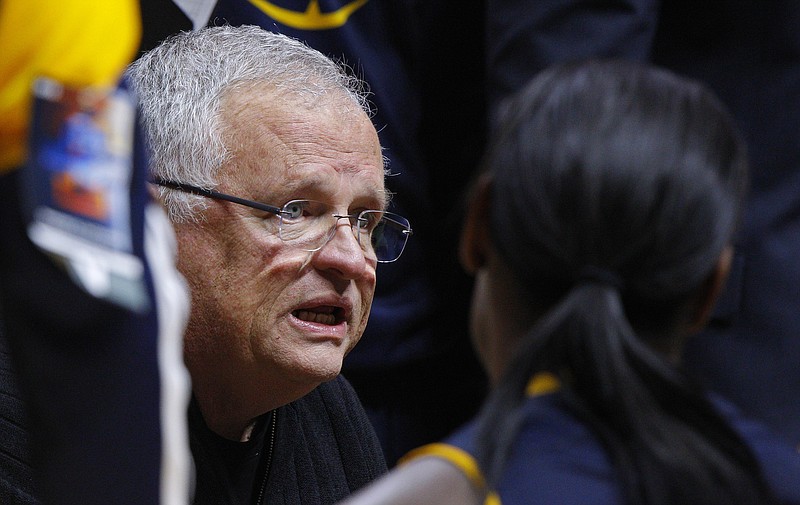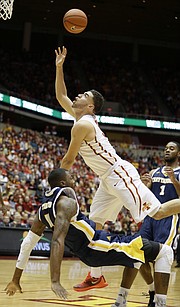The odds have to be enormous. A men's and women's basketball team from the same mid-major university both playing on the road on the same night against opponents ranked No. 4 nationally? You're more likely to get struck by lightning and bitten by a shark on your way to buying the winning Powerball ticket at the neighborhood Handy Andy.
Yet that's just what happened to the University of Tennessee at Chattanooga men's and women's Mocs on Monday night.
The men lost for the first time this season at Iowa State, the No. 4 Cyclones overwhelming them 83-63. The UTC women - in what might be the most pride-producing loss of coach Jim Foster's Hall of Fame career - spotted big sister Tennessee a 26-7 lead after one quarter, fell behind by as much as 23, then lost by two, yes TWO, 59-57.
And for all those Volniacs out there who want to say that it was five points until a meaningless 3-pointer inside the final three seconds, well, UTC had closed to within 53-51 with 2:49 to go.
Not that Foster's ever been into moral victories. Especially not with his close friend Geno Auriemma about to bring the top-ranked, three-time defending national champion UConn Huskies to McKenzie Arena on Monday night.
With words delivered as only Foster can deliver them, he said of the UT loss following last year's upset of the Lady Vols: "I did not like (the Mocs') eyes in the first quarter. I don't like the look of fear. I don't like the look of 'I don't want the responsibility.' We kept talking about that, and you could see it starting to disappear."
A lot of us believe all these pre-Thanksgiving games should disappear for both men and women. Used to be the college basketball season usually began on the Saturday after Thanksgiving. Look around the country this weekend and most teams will have five or more games under their belts by then.
The school that wins it all now is likely to have played 40 games. When Indiana became the last undefeated men's NCAA champ in 1976, the Hoosiers went 32-0.
Particularly at the men's level, the oversaturation of games and television coverage of those games is cannibalizing the sport.
For an example, take Monday night. Hoops junkies had to choose between the CBE Classic in Kansas City, where preseason No. 1 North Carolina was methodically carving up Northwestern on ESPN2, or soak in the pre-Thanksgiving tradition of the Maui Classic on ESPNU. And there were plenty more games on lesser networks.
It's all too much of a great thing, and it threatens the long-term health of the game each year. No other sport on the college calendar cuts so deeply into both semesters of a student-athlete's school year as college hoops. Given the fact that, particularly on the men's side, those are also, arguably, the least prepared for college academic work when they arrive, it's folly to believe these young people can deliver their best performances on the court and in the classroom with such demanding schedules.
The idea of a one-semester college season - which was first suggested by former Kentucky athletic director C.M. Newton, who was also an NCAA tournament participating coach at Alabama and Vanderbilt - picked up steam earlier this fall when Pac-12 commissioner Larry Scott embraced the idea.
"I do love the idea of making college basketball a one-semester sport, a little bit more compact," he told writers at the league's preseason media event. "That all makes sense on a lot of levels. I think the balance of that is what would it do to the way the college basketball season ends?"
There's the rub, of course.
Or as Big Ten commissioner Jim Delany told ESPN, "Can we move it into a middle of December start time? If you pick up a month there, you're talking about a month on the back end. You're talking about competition with NBA playoffs. You're talking about the start of the baseball season. You're talking about conflicts with (the Masters). I don't think it's an easy answer at all."
And it's not. But for all but a handful of schools such as Kentucky, North Carolina, Duke, Indiana, Kansas and such, fewer games might bring more fans. Perhaps cut the regular season to 25 total games, which would mean the max the national champ could expect to play would be 34 or 35 instead of 40.
Then again, if there were potentially fewer games on the schedule, UTC - particularly the men - might find it harder to schedule games at schools such as Georgia and Illinois, since the Mocs might not excite those fan bases as much as Power Five conference foes.
As Foster discussed Monday's loss to UT, he said, "We can play a lot of defenses. We can do a lot of things defensively. We just need to grow."
Both the men and women Mocs can do more good things in the same season than perhaps ever before in school history. They both should reach their respective NCAA tournaments by winning Southern Conference championships. Given anything close to fair seeds, they both may stand a reasonable chance of advancing in March Madness.
They are textbook examples of what can happen when a savvy athletic director makes smart coaching hires. But just think what it might be like if UConn's women's season began this coming Monday inside Chattanooga's McKenzie Arena - good friends and fellow Hall of Famers Auriemma and Foster opening their seasons against each other - rather than merely being the fourth game on the Huskies' schedule.
Would starting college basketball after Thanksgiving not be a far better way to grow the game?
Contact Mark Wiedmer at mwiedmer@timesfreepress.com.

